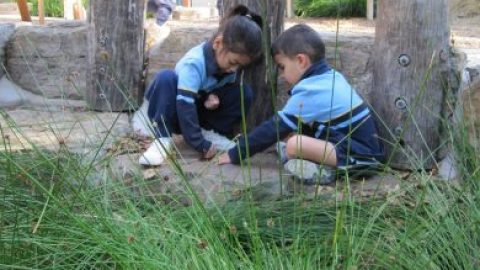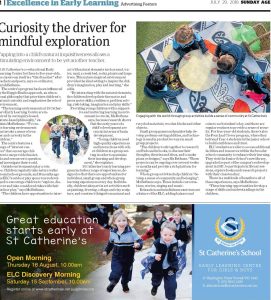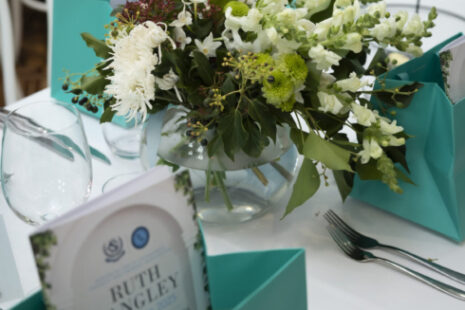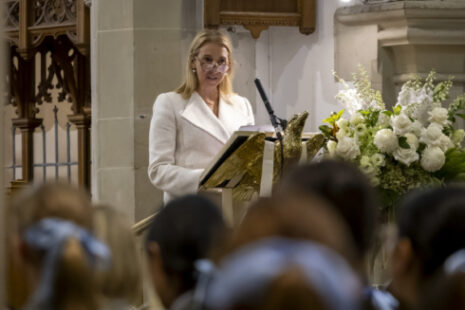Excellence in Early Learning at St Catherine’s

At St Catherine’s co-educational Early Learning Centre for three to five-year-olds, the classroom itself is a “third teacher” after teachers and peers, says coordinator, Sarah Bethune.
The centre’s program has been influenced by the Reggio Emilia approach, an educational philosophy which prioritises children’s natural curiosity and emphasises the role of environment.
“The learning environments at St Catherine’s Early Learning Centre are inspired by our inquiry-based, nature-based philosophy,” explains Ms Bethune. “We create learning environments that invoke a sense of wonder and curiosity in the children.”
The centre features range of “interest centres” that encourage children to use provided materials and resources to question and investigate their world.
Outside environments play a role, too. Children regularly take nature walks around school grounds, and 18 months ago the ELC’s outdoor play space was redeveloped to encourage children to “explore, discover and take considered risks with their outdoor play,” says Ms Bethune.
“The children have opportunities to interact with natural elements such as sand, water, mud, a creek bed, rocks, plants and large trees. This nature-inspired environment provides the ideal setting to inspire the children’s imagination, play and learning,” she adds.
“By interacting with the natural elements, the children develop their fine motor and gross motor skills, resilience, problem-solving, risk-taking, imagination and play skills.”
 Providing young children with a supportive and nurturing learning in environment is crucial, Ms Bethune says, because research shows that the early years of a child’s development are crucial in terms of brain development.
Providing young children with a supportive and nurturing learning in environment is crucial, Ms Bethune says, because research shows that the early years of a child’s development are crucial in terms of brain development.
“Young children need high-quality experiences and interactions with other children in a group setting in order to maximise their learning and development,” she explains.
St Catherine’s early learning program includes a range of experiences, designed so that there are opportunities for individual, small group and whole group learning experiences every day. Individually, children take part in art activities such as painting, drawing, collage and clay sculpture, and construct things from natural and recycled materials, wooden blocks and other objects.
Small group games and puzzles help develop problem-solving abilities, and technology is used in productive ways in small group projects.
“The children work together to research on iPads and in books, to discuss their thoughts, theories and ideas, and to make plans or designs,” says Ms Bethune. “These projects can be ongoing over several weeks or months and provide a rich platform for learning.”
Whole group activities help children “develop a sense of community and belonging”, Ms Bethune says. These include conversations, stories, singing and music.
Relaxation and mindfulness exercises are a fixture of the ELC, adding balance and calm to each student’s day, and there are regular routines to provide a sense of security. For four-year-old students, there’s also the Four Leaf Clover program, where they befriend Year 4 students in the junior school to build confidence and trust.
ELC students are fortunate to be able to access additional facilities and resources within the broader school community to enhance their learning. With the addition of our new state-of-the-art Junior School, ELC students now visit the Junior School Library to participate in Library sessions, explore literature and undertake research in relation to current projects with their class teacher.
There are a multitude of benefits to all of these experiences, says Ms Bethune.
“These learning opportunities develop a range of skills and understandings in the children. By being in a language-rich, social environment, the children learn how to share, take turns, negotiate, collaborate and problem solve. Their confidence and resilience also develops as they connect with others.”
Ms Bethune says parents of ELC students often provide the school with glowing feedback about the program.
“The families know that they are giving their children the best possible start to their education.”





